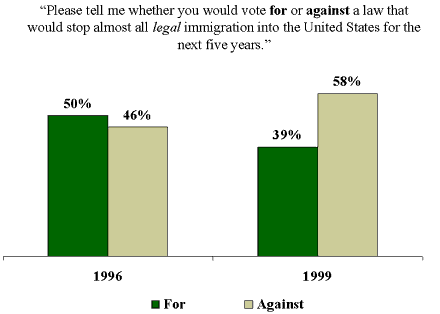GALLUP NEWS SERVICE
PRINCETON, NJ -- With the U.S. Senate scheduled to open hearings today on the country's immigration policy, a review of Gallup polls over the past several years reveals a public that is not especially positive about people from foreign countries coming to live in the United States. Substantial numbers of Americans, often more than a majority, have wanted to see immigration reduced and even halted, expressed concerns about the economic and cultural consequences of admitting more foreigners to this country, and said it is a bad thing for the country that in the past decade the percentage of foreign-born residents in the United States has increased significantly.
Current poll results suggest that, on balance, slightly more people today hold positive rather than negative views of immigrants. Furthermore, Americans are about as favorably disposed toward their foreign-born compatriots as they have ever been during the past 25 years, largely it appears because of relatively good economic times. Still, about four in 10 Americans continue to hold mostly negative views about immigrants.
The most recent Gallup poll on this subject was conducted March 26-28 of this year. When asked about the current level of immigration, 10% of Americans said it should be increased, 41% said kept the same, and 43% said decreased. Over the years, the number calling for an increase has never exceeded 13%, while fluctuating mostly in the 6% to 10% range. The percentage wanting a decrease has shown much greater fluctuation, from a high of 65% in 1993 and 1995 to a low of 33% in 1965.
Only infrequent measures of immigration attitudes have been made during the period from 1965 until now, but the two most negative readings were taken in the aftermath of the economic recession of the early 1990s, when more than 60% of all Americans wanted to see a reduction in immigration, and only half that number wanted to see it increase or remain the same. The most positive readings, by contrast, were found during relatively good economic times -- in April 1965, and in the most recent period from 1999 until now. During both of those time periods, more people said they wanted to increase immigration or keep it at the same level rather than reduce it -- by 13 percentage points in 1965 and by anywhere from seven to 16 points in the past couple of years.

Another indication that the state of the economy may exert considerable influence on Americans' views toward immigrants is found in two surveys that asked whether people would want to stopallimmigration for five years. As shown below, Americans were about evenly divided on the matter in 1996, as 50% said they were for the idea, while 46% were against it. Three years later, when the economy was rated as quite strong by the public, Americansopposeda five-year halt to legal immigration, by 58% to 39%.

Apart from their views about the rate of immigration, Americans express ambivalence about the effect that immigrants have on the nation's culture. In the current survey, 45% say that the increasing diversity in the United States that is created by the admission of immigrants mostly improves American culture, just slightly more than the 38% who say the culture is threatened. This view is considerably more positive than what Americans expressed in 1993, when -- by a margin of 55% to 35% -- Americans said that the increasing diversity of immigrantsthreatenedAmerican culture.
The same ambivalence is found in the way the public perceives the dramatic increase in foreign-born residents in the country during the past decade. While 44% say it is a "good thing" for the country, that is barely more than the 39% who say it is a "bad thing."
Economic Consequences of Immigration
Many Americans tend to be concerned also about the economic consequences of immigration. For the most part, those who are concerned do not believe that immigrants take needed jobs away from other Americans, but rather that immigrants take low-paying jobs that drive down wages or that immigrants cost the taxpayers too much by using government services like public education and medical services.
In a poll taken in September of last year, only 13% of respondents said that immigrants mostly take jobs that Americans want, while 75% said that immigrants mostly take low-paying jobs that Americans don't want. Still, the same poll showed a public divided over whether the low-cost labor provided by immigrants helped the economy (44%), or hurt it by driving down wages in general (40%). In February 1999, more people said immigrants were hurting the economy than helping it (48% to 42%), while in 1993 the margin was even greater -- 64% said immigrants were hurting the economy, while just 28% said they were helping it.
The poll last year showed a public that was also divided over whether immigrants in the long run become productive citizens and pay their fair share of taxes (48%) or cost the taxpayers too much by using government services (40%). Again, the margins were more negative in 1993, when -- by 56% to 37% -- Americans said immigrants burdened taxpayers too much.
Survey Methods
Current results are based on telephone interviews with -- 1,024-- national adults, aged 18+, conducted March 26-28, 2001. For results based on the total sample of National Adults, one can say with 95% confidence that the margin of sampling error is +/- 3 percentage points.
In addition to sampling error, question wording and practical difficulties in conducting surveys can introduce error or bias into the findings of public opinion polls.
In your view, should immigration be kept at its present level, increased or decreased?
|
|
Present level |
Increased |
Decreased |
No opinion |
|
% |
% |
% |
% |
|
|
2001 Mar 26-28 |
41 |
10 |
43 |
6 |
|
2000 Sep 11-13 |
41 |
13 |
38 |
8 |
|
1999 Feb 26-28 ^ |
41 |
10 |
44 |
5 |
|
1995 Jul 7-9 |
27 |
7 |
62 |
4 |
|
1995 Jun 5-6 |
24 |
7 |
65 |
4 |
|
1993 Jul 9-11 |
27 |
6 |
65 |
2 |
|
1986 Jun 19-23 † |
35 |
7 |
49 |
9 |
|
1977 Mar 25-28 |
37 |
7 |
42 |
14 |
|
1965 Jun 24-29 |
39 |
7 |
33 |
20 |
|
^ Based on 514 national adults; margin of error ± 5 PCT. PTS. |
||||
|
† CBS/NYT |
||||
In your view, does the increasing diversity in the United States that is created by immigrantsmostly improveAmerican culture ormostly threatenAmerican culture?
|
|
Mostly improve |
Mostly threaten |
BOTH |
NEITHER |
No |
|
|
% |
% |
% |
% |
% |
||
|
2001 Mar 26-28 |
45 |
38 |
4 |
5 |
8 |
|
|
1993 Jul 9-11 ^ |
35 |
55 |
3 |
3 |
4 |
|
|
^ |
In your view, does the increasing diversity that immigrants bring to this countrymostly improveAmerican culture ormostly threatenAmerican culture? |
|||||
|
(vol.) = Volunteered response |
||||||
How many recent immigrants would you say live in your area -- many, some, only a few, or none?
|
|
|
|
|
|
UNSURE (vol.) |
No |
|
% |
% |
% |
% |
% |
% |
|
|
2001 Mar 26-28 |
39 |
23 |
27 |
8 |
3 |
* |
|
1999 Feb 26-28 |
34 |
23 |
29 |
10 |
-- |
4 |
|
1993 Jul 9-11 |
27 |
25 |
34 |
12 |
-- |
2 |
|
(vol.) = Volunteered response |
||||||
|
*Less than 0.5% |
||||||
The new U.S. census results show that the percentage of people now living in the United States but who were born in another country has increased significantly during the past 10 years. Just your opinion, is this a good thing or a bad thing for the country?
|
|
Good |
Bad |
BOTH/ |
No |
|
% |
% |
% |
% |
|
|
2001 Mar 26-28 |
44 |
39 |
11 |
6 |
|
(vol.) = Volunteered response |
